Justice
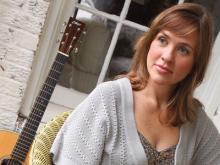
SINGER-SONGWRITER Caroline Herring was completely naked when she truly found God.
Straight out of college, she spent three months as a missionary in China. “I was so ill-equipped,” she says now, over tea just before a show in Knoxville, Tenn. “The program was respectable—we weren’t Bible smugglers, but obviously we had an agenda.”
One of her students—a woman who had journeyed seven hours to attend English classes Herring was teaching with her fellow missionaries—took a liking to her and asked if she would leave the comfort of her air-conditioned room (with a private toilet) to join her students at the dirty, crowded bath-house, outfitted with several spigots in the ceiling. Herring believes it was a way to welcome her into their fold.
“And I felt like I was a part of humanity for the first time in my life,” Herring says, her face suddenly luminous. “My preconceived notions about the Trinity just slipped away. It was too much to comprehend, but I knew that the Holy Spirit was moving amongst us because we were people together, being kind to one another.”
Herring, now 42, says the experience changed her life. She left China a different, humbled person, with whole new ideas about what God, religion, and service were.
“I knew for sure that I had a lot more to figure out about my own place in the world before I had the audacity to spread the word of Christ across the globe,” she says.

A TRADITIONAL whale-oil lamp is solemnly lit by an Inuit elder. After being brushed with cedar and smudged with sage, three commissioners take their seats. A survivor begins his testimony, haltingly narrating painful memories from 60 years ago. Soon tears begin to flow, and a support person carefully collects the tear-soaked tissues into a basket, to be added to the sacred fire that burns outside the hall. In this space, so filled with sorrow and rage, every ritual communicates respect, empathy, and determination, turning public halls into sanctuaries of healing.
For seven generations Indigenous Canadian children were taken from their homes and sent, most often by force, to Indian Residential Schools. Churches began operating these schools in the early 1860s, and by the 1890s the federal government had begun to make attendance mandatory as part of a policy of assimilation into Canadian society. In these schools children were forbidden to speak their native languages, forced to conform to European ways of life, and often abused emotionally, physically, and sexually. Though most residential schools were closed by the mid-1970s , the last was not shuttered until 1996.
As part of a 2007 legal settlement with survivors, the Truth and Reconciliation Commission of Canada (TRC) was created, with a five-year mandate to document the testimony of survivors, families, and communities affected by the residential school experience and to inform all Canadians about this tragic history. Launched in Winnipeg in June 2010, the TRC will include seven national and a number of regional hearings throughout the country. The hope is to “guide and inspire Aboriginal peoples and Canadians in a process of reconciliation and renewed relationships that are based on mutual understanding and respect.”

Writing books is a strange process. When you’re in the middle of creating something this big, it tends to consume your every waking moment in some way. I can’t watch TV or have a conversation with a neighbor without my mind searching the content for narrative or thematic threads to weave into the chapter I’m working on. It can be a little bit maddening, at least for those around us, I expect. But I love it.
One unlikely wonderful source for material as of late for me has been the show “Louie,” by comedian Louis C.K. To say he’s irreverent would be underselling his shock value. He’s a little bit like Trey Parker and Matt Stone of South Park fame in that he levels the playing field of propriety simply by making nothing off limits. Some might not be able to get past his coarse and occasionally nihilistic approach to life, but I consider him to be nothing short of prophetic in his observations about the human condition.
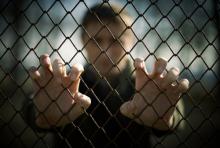
What struck me as he spoke was the sheer human potential of this my client, wasted. That matters for all of us because of an unflinching Scriptural text about how we can enter the kingdom of God: “for I was hungry and you gave me food; I was thirsty and you gave me something to drink; I was a stranger and you welcomed me, I was sick and you took care of me. I was in prison and you visited me….just as you did it to the least of those who are members of my family, you did it to me.” (Matt. 25:35-40)
That’s the test. Not beliefs or intentions. Actions.
Specific actions: Jesus tells us to visit people considered the worst among us, those accused of breaking the law.
It’s not just innocent prisoners we are to see; it’s prisoners. They are all Jesus.

Bio: Catholic Palestinian film director and founder of the nonprofit Open Bethlehem. operationbethlehem.com
1. How did Open Bethlehem get started?
Growing up in Bethlehem, I always wanted to leave. I settled in London, but when events started becoming worse and worse in the region, I wanted to do something. So I went back and started working on a film. My cousin encouraged me and said, “Look at what’s happening to our city. Why don’t you do more than just a film?” And so together, in 2005, we started a campaign called Open Bethlehem.
2. What is its main goal?
The idea is to use Bethlehem as a doorway into the region. We created the Bethlehem Passport, which is like an honorary citizenship, inviting people to partake in the town that stands for joy and goodwill to all. The passport is an appeal to everybody to do something to help bring peace to the Middle East. We aim mostly at educating people abroad—policymakers, the media, and church leaders—about the plight of Bethlehem, its Christian community, and the diversity of the city.
Since the establishment of The Council for Biblical Manhood and Womanhood in 1987 and J.I. Packer’s 1991 article “Let’s Stop Making Women Presbyters” in Christianity Today, there’s been a resurgence of traditionalist theology among some American churches. Instead of advocating “male headship,” they now promote “complementarianism.” Instead of portraying women as intrinsically “serving, subordinate, and supportive,” they now advocate “biblical womanhood.” But it’s the same patriarchal heresy, just with new language.
Rachel Held Evans, a Tennessee-based evangelical Christian raised in conservative Christian churches, decided to turn the tables. She vowed to take all of the Bible’s instructions for women as literally as possible for a year. A Year of Biblical Womanhood: How a Liberated Woman Found Herself Sitting on Her Roof, Covering Her Head, and Calling Her Husband Master is the often-hilarious, engaging, well-researched, deadly serious result. (You can read all about her adventures at rachelheldevans.com). Former Sojourners editorial assistant Betsy Shirley, a student at Yale Divinity School, interviewed Evans in August 2012.

According to the Stockholm International Peace Research Institute (SIPRI), the United States currently spends more than $711 billion per year on military expenditures, which is – by far – the most of any country in the world.
In fact, if one were to combine the totals of the next fourteen nations on the list (China, Russia, the United Kingdom, France, Japan, Saudi Arabia, India, Germany, Brazil, India, South Korea, Australia, Canada, and Turkey), their combined amount is similar to the USA. All together, the USA provides about 43 percent of worldwide military costs, and in addition, the USA per capita ($2,240) and percent of Gross Domestic Product (4.8 percent) in relation to military funding is far greater than any other nation in the world.
With these statistics in mind, one is provoked to ponder some important questions. For example, what is revealed to us about the USA – and our world in general – when military expenses constitute such a significant percentage of a government budget?
In specifics, why does the USA spend far more on its military than any other country? In addition, what is revealed to us about the condition of our global village when $1.73 trillion is allocated each year to military funding? As stated by Sojourners CEO Jim Wallis, “A budget is a moral document. It clearly demonstrates the priorities of a family, a church, an organization, or a government. A budget shows what we most care about.”
Hello fellow Sojourners!
This is a brief missive for your enjoyment. I just returned from the Wild Goose Festival in Corvallis, Ore.
Yes, Oregon and not North Carolina. You see, in a fit of wisdom, the good people of Wild Goose found a west coast location. I hope it worked well for them because I'm sold on the place.
I wish you could have been there. It was amazing. To tantalize you into attending next year, here (in no particular order) are Nine Good Reasons to Attend The Wild Goose Festival.
1. There are no bugs.
None. Well, some flies, but this is Oregon and not North Carolina and though the nights are chilly and the mornings moreso (I awoke the last morning to see my breath in the air), the sun arose and everything warmed up to make for some of the most beautiful weather you'll ever experience.
2. All the notables are there.
Rachel, Richard (and Richard), Brian, Nadia, Gareth, Bruce, Christian, Amy, Yvette, Hilary, Greg, Steve...So many people to meet and to know.
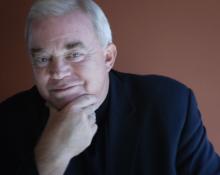
There is hardly a more controversial political battle in America today than that around the role of government. The ideological sides have lined up, and the arguments rage about the size of government: how big, how small should it be? Some famously have said government should be shrunk so small that it "could be drowned in a bathtub."
But I want to suggest that what size the government should be is the wrong question. A more useful discussion would be about the purposes of government and whether ours is fulfilling them. So let's look at what the Bible says.
The words of Paul in the 13th chapter of Romans are perhaps the most extensive teaching in the New Testament about the role and purposes of government. Paul says those purposes are twofold: to restrain evil by punishing evildoers and to serve peace and orderly conduct by rewarding good behavior. Civil authority is designed to be "God's servant for your good" (13:4). Today we might say "the common good" is to be the focus and goal of government.
So the purpose of government, according to Paul, is to protect and promote. Protect from the evil and promote the good, and we are even instructed to pay taxes for those purposes. So to disparage government per se — to see government as the central problem in society — is simply not a biblical position.
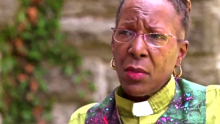
The Rev. Andrena Ingram is currently the only known Lutheran ordained pastor living openly with HIV. Her husband's death from an AIDS-related illness, and the shame that he felt, inspired the pastor to be open about her own diagnosis with HIV. She is known as "The HIV Minister" – a title that has helped others with HIV reach out to her for help.
Listen to Ingram tell her story inside the blog...
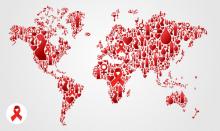
A palpable feeling of hope and urgency hung heavy in the air of Washington, D.C., this week as thousands of activists descended on the nation’s capital to encourage and inspire colleagues and decision-makers to “turn the tide on AIDS.”
The International AIDS Conference 2012 has returned to the United States, thanks in part to the lifting of the HIV/AIDS travel ban by the Obama Administration in 2010, which followed work from President George W. Bush also to lift the ban.
As part of the Conference, faith leaders from across the world were invited Tuesday morning to a forum hosted by the White House. It was an opportunity to hear from U.S. and international experts and officials, as well as come together as a community of faith, standing up against the stigma and isolation which have been two of the biggest roadblocks to achieving the goal of an AIDS-free generation.
Tuesday’s event centered around two panel discussions — one examining what the faith community uniquely brings to the table in tackling the HIV/AIDS epidemic, and the other focusing on the relationship between governments and people of faith in building the effective partnerships needed to tackle it.
The tone of the discussions was, in many ways, extremely positive. We heard about vast improvements in treatments and holistic care, services often administered by faith-based organizations around the world.
“Hope,” as White House Office of Faith-based and Neighborhood Partnerships Executive Director, Joshua DuBois, noted, is overcoming “fear.”
“TAMARA” GREW UP in an affluent, middle-to-upper-class neighborhood. Her friends, including the ones she knew from church, were her cousins, neighbors, and other kids who were a lot like her. Her parents worked hard at building a “safe zone” to protect her from harm—but, as Tamara looks back on her childhood, she can see the lasting fear that it instilled in her.
After she got her driver’s license, she always double-checked that her car doors were locked as soon as she was in the vehicle, and she avoided her city’s small downtown area. To this day, she detests large cities and is constantly worried that someone will rob her. Tamara suffers from “mean world” syndrome: a hyper-vigilant state in which strangers are to be ignored and avoided, new experiences are to be feared, and other people’s problems are just that. It’s a survival mode based on scarcity, hoarding, looking out for number one. Too often, it involves shrinking back from active involvement in the biblical call to social justice.
Sadly, many parents put children in a kind of quarantine—not seeking justice, but fearing contamination. The view that children are pure and the world is corrupt has led well-intentioned adults to (over)protect children from poverty, disease, violence, and other “pollutants.” (Of course, this isn’t to say that all children grow up sheltered; many experience situations of poverty, violence, and oppression that sheltered families can’t even imagine.) Ironically, as children are quarantined from the harmful realities of the world, they’re often exposed to virtual violence through television, music, and video games. This is a recipe for creating kids who, like Tamara, are afraid of the unknown that exists beyond their bubble-wrapped microcosms.

On Thursday, the Supreme Court ruled that the federal government does hold the constitutional power to mandate that most American's purchase health insurance or pay a penalty. This power is maintained in Congress’s ability to levy taxes.
The justices also ruled that the federal government does hold the constitutional power to expand Medicaid, making more people eligible to receive the benefit, but, like the original Medicaid law of 1965, states can opt out of the expansion if they so choose.
What does this mean? And what does this mean for Jesus followers?
SHAKORI HILLS, N.C. — On a swelteringly hot solstice weekend in the southeast, a couple thousand folks gathered in the woods of North Carolina to get their collective goose cooked. An early summer camp like no other, this second annual festival invokes a Celtic image of the Holy Spirit and sparks unlikely convergences inside the great emergence of the contemporary Christian counterculture.
The Goose blends the best of an intellectually engaged faith conference and social justice activist base camp with the sonic frivolity of a modern rock festival and stirs all concepts and collapses all constructs in a steamy potluck stew of primal camp meeting and postmodern tent revival. Without a doubt, the blossoming and beckoning of the Wild Goose movement in North America heralds a bright radical future for today’s Jesus followers bringing the kingdom come.
Wild Goose Festival: Sunday Call to Worship from cathleen falsani on Vimeo.
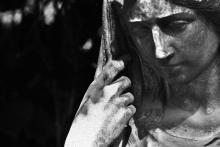
Carolyn Winfrey Gillette wrote this hymn based on Micah 6:8 after attending Bread for the World’s Lobby Day on June 12th and reading Jim Wallis’ “The Missing Religious Principle in Our Budget Debates.”
O God, You Call for Justice
AURELIA 7.6.7.6 D ("The Church's One Foundation")
O God, you call for justice—for goodness, never greed!
You seek a world of fairness where all have what they need—
Where all have food and water and homes in which to thrive,
Where all have hope and laughter and joy to be alive!
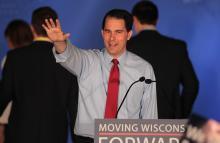
The votes are counted, the concession speeches made, the victory parties had. Wisconsin, a word that has become as synonymous with divisive politics as it is for cheese and beer, is done with the recalls.
In the end, some change was made. Between the first round of recalls and yesterday’s election, the senate has shifted from Republican to Democratic control. And yet, not much has changed. We still have a union-busting governor and a climate change doubter as lieutenant governor.
The calls, from politicians and citizens, have been pretty consistent. It is time to move forward. It is time to put aside our divisions and find a way to govern together. It is time of our state to heal.
Whatevs.
See, I’m not all that interested in moving forward – not because I like the fighting or because I think it is healthy to be so divided that the mere mention of politics in casual conversation makes blood pressures boil.
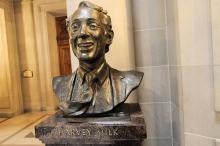
Today, the political and social activist is remembered for his contributions to transform the world into a more inclusive, affirming environment for all people. As the first openly gay person to serve in an elected position, Milk’s 1977 ascent into public office has been instrumental in paving the way for LGBT people to authentically wield roles of power, consciousness, and change.
Sadly, Milk’s life was cut short at age 48 when he was tragically assassinated. Though he served less than a full year in public office (San Francisco’s Board of Supervisors), he has left behind a powerful vision of a better world. His commitments to justice has inspired countless people to construct programs and organizations that organize, lobby, write and prophesize a habitat that is all just and peaceable for all, regardless of gender, sexuality, race or age.

Nearly a quarter of a century after DNA testing was used to prove that a defendant had been falsely convicted of a crime, the American public has become familiar with the phenomenon and how the script plays out in our courtrooms.
The exonerated defendant stands before a judge and is informed that the conviction is vacated and the charges are dismissed. And then the former inmate —more than 100 have come from Death Row — is joined by family members and lawyers in a celebration on the courthouse steps.
Yes, it is a joyous occasion to step from behind prison bars after years — as many as 30 years in one case —of being locked up for a crime that was not committed.
But, as a report issued Monday by the National Registry of Exonerations makes clear, behind every one of these jubilant moments are tragedies, some of them of enormous proportion.
The report documents nearly 900 individual cases of exoneration. Combined, these (mostly) men and women served more than 10,000 years in prison for crimes they did not commit. In fact, in more than 100 cases, there was no crime at all — accidents were mischaracterized as murders and crimes were just concocted based on a web of lies and falsehoods.
 My generation is a practical generation, and I am challenged by my faith to be a practical person. Don’t get me wrong: I love all verbal and theological things: story, theology, politics, and history, perhaps even inordinately.
My generation is a practical generation, and I am challenged by my faith to be a practical person. Don’t get me wrong: I love all verbal and theological things: story, theology, politics, and history, perhaps even inordinately.
But I believe in places. I believe that relationships, rooted in love, transform us. And it just so happens that most lasting human relationships are formed around the table....
The table is a place where we bypass rank and privilege and create a zone where you take what you need and bring what you are able. It is a commons where we are defined in new, equal relationships with one another, ensuring that all have enough and sharing. Believers in Acts took the idea of the common table even further and held all possessions in common, caring for the widows and dispossessed from the surplus, bypassing the inequality created by the currency stamped with the deified Caesar.
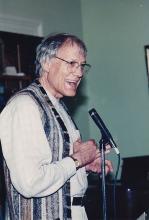
Walter Wink, 76, a world-class biblical scholar and non-violent practitioner, crossed over to God on May 10 at his home in Western Massachusetts. Following a slow decline, he had been in hospice for several weeks in the company of his beloved June and their family. (See "Confronting the Powers," Sojourners December 2010)
As a first year seminarian in New York City, more than 35 years ago, I was fortunate to have Walter as my New Testament instructor. In a seminar session on the "pearl of great price" in Matthew, I have a vivid memory of him breaking the discussion so we could go round the circle and each reply to the question: "For what would you be willing to die?" I don't so much recall my own halting answer, as the depth of the question he understood was put to us by the text. It's since become my conviction that no one should escape seminary (or baptismal preparation for that matter) without facing with that query.
Which is to say he was himself an engaged scholar, connecting the academy with the risk of the streets. While filling his first teaching post at Union Seminary in New York he was simultaneously serving on the national steering committee of Clergy and Laity Concerned about the War in Vietnam (1967-76).
He was notorious for foundation-shaking works. When I met him, Walter was a rising star in the biblical guild, on the fast track at Union. Then he published a little polemical book called The Bible in Human Transformation (1973) which made bold to declare, “Historical biblical criticism is bankrupt." It assailed the myth of scientific objectivity, the disembodied approach which kept the text at arms length and pre-empted commitment. In many respects it anticipated the contextualizing hermeneutics of feminist and liberation readings, but it didn't win him friends in the academic guild.